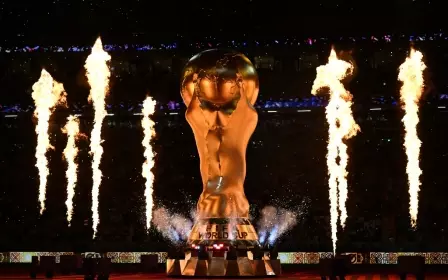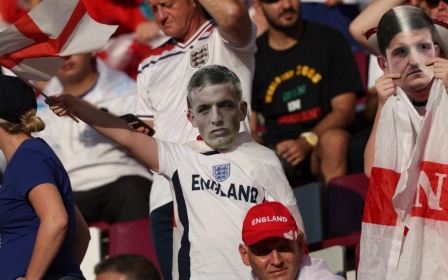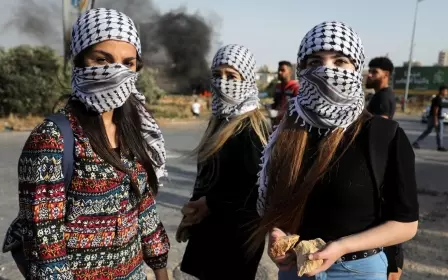Qatar World Cup 2022: Why are there so many Palestinian flags?
Found within the sea of fans cheering on in the stadiums, and in the streets of Doha and other Qatari cities, the Palestinian flag has made more than a cameo at the World Cup.
Despite Palestine not qualifying for the tournament, which is being held in the Middle East for the first time, its national flag could be spotted during broadcasts of a number of matches, along with other symbols of solidarity with the Palestinian cause.
Many fans were also spotted donning the Palestinian keffiyeh.
Some fans have even broken out into performances of the dabke, a traditional Palestinian folk dance often performed in times of celebration, such as weddings.
Support for Palestine is also evident online, with fans using the hashtag #RaisePalestineFlag to share photos, videos and memes.
New MEE newsletter: Jerusalem Dispatch
Sign up to get the latest insights and analysis on Israel-Palestine, alongside Turkey Unpacked and other MEE newsletters
Fans against normalisation
Fans from around the world came to the World Cup with Palestinian flags in hand, as a show of solidarity and support for the country that many feel connected to.
Some waving the flag did so as a way to raise awareness about the occupation to a global audience.
Many of those holding the Palestinian flag are also doing so as a form of protest against the presence of Israelis at the tournament and the "normalisation" that has occurred as a result of the World Cup.
In November, Israeli fans were able to travel to Qatar directly, with the first ever direct flight between Israel and Qatar landing in Doha in November.
However, many Qatari activists and other Palestinian advocates were angered by the news.
Ahead of the games in Doha, hundreds of fans gathered and waved the Palestinian flag, with reports stating that it was part of an event organised by the Qatar Youth Against Normalisation group.
"It has come as a shock to us that [in the] days leading to the World Cup, Qatar has entered new territories of normalization with the announcement that direct flights will now operate between apartheid Israel and Doha," the group said in a statement.
A Qatari official said the flight agreement was based on “Qatar's commitment to Fifa's hosting requirements and it should not be politicised". However, many still condemned the decision.
Flags, armbands and chants
Support for Palestine has been manifest in various ways during the World Cup so far, many viewing the games as an opportunity to celebrate Palestine.
In one video, Moroccan fans attending the game against Croatia on 23 November could be seen waving the Palestinian flag.
Fans walking around Doha’s hotspots and tourist destinations after matches could also be heard chanting in support of Palestine. The words “Free Palestine” could be heard from people strolling through the historic Souq Waqif.
Some Saudi and Qatari fans were seen distributing Palestinian flags among fans.
Meanwhile, fans also shunned Israeli journalists covering the event, refusing to appear in interviews, while others crept up behind journalists and waved the Palestinian flag.
Social media has also been awash with people wearing armbands adorned with the keffiyeh print.
Justice for Shireen
Moroccan fans also used their country's match against Croatia as an opportunity to call for justice for Shireen Abu Akleh, a Palestinian-American journalist who was killed by Israeli forces earlier this year while covering the Israeli crackdown on Jenin.
Fans raised posters saying "no to normalisation" and wore T-shirts with the journalist's face printed on them, with her press vest being visible.
Morocco is one of a handful of Arab countries to have normalised relations with Israel in recent years.
Lawyers representing the family of Abu Akleh have asked the International Criminal Court to open a new investigation into her killing, while Palestinians and fellow journalists around the world have repeatedly called for her killers to be held accountable.
Her death sparked widespread condemnation, followed by multiple investigations, including one by the UN, which concluded that Israeli forces likely killed her.
Middle East Eye delivers independent and unrivalled coverage and analysis of the Middle East, North Africa and beyond. To learn more about republishing this content and the associated fees, please fill out this form. More about MEE can be found here.




